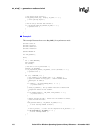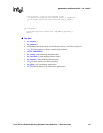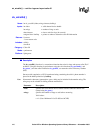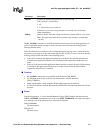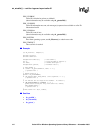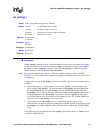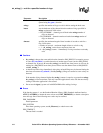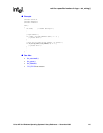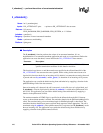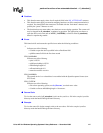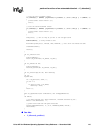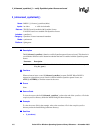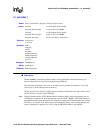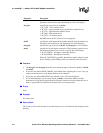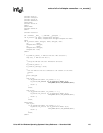
446 Voice API for Windows Operating Systems Library Reference — November 2003
li_attendant( ) — perform the actions of an automated attendant
li_attendant( )
perform the actions of an automated attendant
!
!!
! Description
The li_attendant( ) function performs the actions of an automated attendant. It is an
implementation of an automated attendant application and works as a created thread. Before the
application can create the thread, it must initialize the DX_ATTENDANT data structure.
This function loops forever or until the named event specified in the szEventName field of the
DX_ATTENDANT data structure becomes signaled. While waiting for the named event to be
signaled, this function checks for an incoming call. By default, it assumes that an analog front end
is present and uses dx_setevtmsk( ) and dx_getevt( ) to determine if an incoming call is present.
The application can override the default analog front end behavior by supplying a function in the
pfnWaitForRings field of the data structure.
Once an incoming call is detected, the call is answered. A voice file intro.att is played back, and
li_attendant( ) waits for digit input. By default, dx_sethook( ) is called unless pfnAnswerCall is
not NULL. The application can override the default analog front end behavior by supplying a
function in the pfnAnswerCall field.
The maximum number of DTMF digits is specified in the nExtensionLength field. If timeout
occurs or the maximum number is reached, the translation function in the pfnExtensionMap field is
called. The translated string, whose maximum length is nDialStringLength, is then dialed. The
translation function should insert pauses and flash hook sequences where appropriate. The call is
terminated using dx_sethook( ) unless pfnDisconnectCall is registered, and li_attendant( ) awaits
the next incoming call. The application can override the default analog front end behavior by
supplying a function in the pfnDisconnectCall field.
Name: int li_attendant(pAtt)
Inputs: DX_ATTENDANT *pAtt
• pointer to DX_ATTENDANT data structure
Returns: 0 if success
EDX_BADPARM, EDX_BADPROD, EDX_SYSTEM, or -1 if failure
Includes: syntellect.h
Category: Syntellect License Automated Attendant
Mode: synchronous, multitasking
Platform: Springware
Parameter Description
pAtt pointer to the Automated Attendant data structure, DX_ATTENDANT, that
specifies termination conditions for this function and more.



